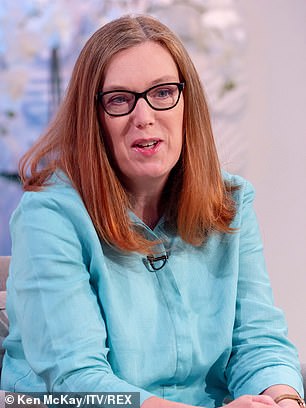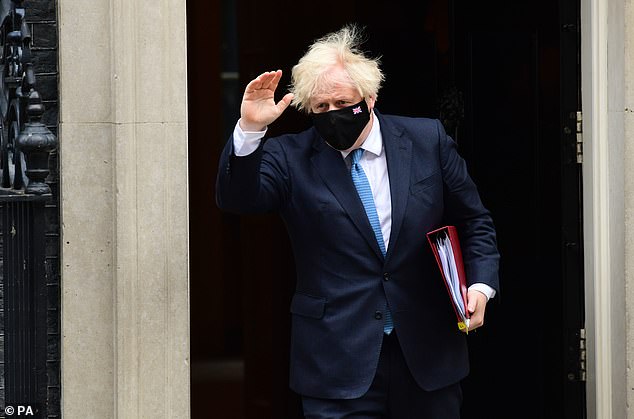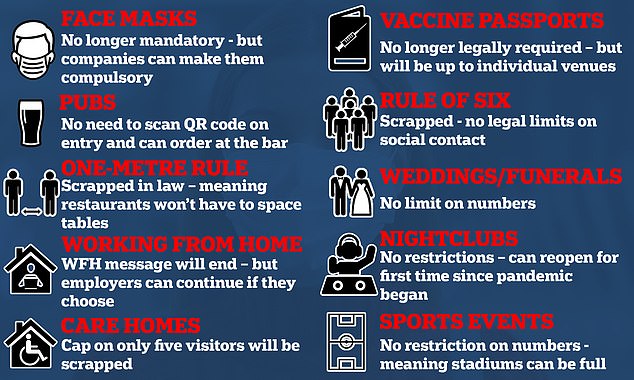Vaccines AND masks are best way to protect ourselves after Freedom Day, says scientist behind Oxford University’s Covid vaccine
- Professor Dame Sarah Gilbert says wearing masks indoors is ‘a sign of respect’
- The mandate on wearing masks will be dropped on ‘Freedom Day’ on Monday
- Boris Johnson urged people to continue wearing masks in busy indoor settings

Professor Dame Sarah Gilbert, who helped develop the AstraZeneca jab, said wearing a face covering to protect other people in indoor settings is ‘a sign of respect’
Vaccines and masks are the best way to protect ourselves after ‘Freedom Day’ on Monday, one of the scientists behind the Oxford University Covid vaccine claimed today.
Professor Dame Sarah Gilbert, one of the brains behind the AstraZeneca jab, said wearing a covering in crowded indoor settings was ‘a sign of respect’.
She admitted masks do little to protect the wearer, but claimed they may prevent some people from passing the virus onto others.
Dame Sarah said she will follow Professor Chris Whitty‘s advice to continue to wear masks when they are no longer a legal requirement next week.
Her comments come amid fears that mask-wearing etiquette could spark a culture war post ‘Freedom Day’ on Monday.
Ministers and scientific advisers are still encouraging people to don a mask in crowded spaces where the risk of Covid is higher – such as on trains or busy shops.
Adding to confusion, London Mayor Sadiq Khan this morning revealed that face coverings will still be compulsory on the Tube, buses and taxis in the capital.
Dame Sarah told Good Morning Britain: ‘None of the protective measures are completely effective on their own and we get the best protection when we link up different ways of protecting ourselves.
‘So if we get everybody who is eligible for the vaccine to have the vaccine, if we wear a facemask indoors in crowded areas.

Transport Secretary Grant Shapps today backed London Mayor Sadiq Khan ‘s move to keep them compulsory on the Tube, buses and taxis in the capital. Pictured: People wear face masks at Waterloo Station in London today

Boris Johnson (pictured today) called for continued mask-wearing in busy indoor settings such as trains, supermarkets and cinemas despite the mandate being lifted on Monday

The coronavirus restrictions which will be removed from July 19
‘Remember, we wear a mask to protect other people — they’re not to protect us so much as to protect other people from us, from the risk that we might be infected.’
‘And I think it’s a sign of respect, if you’re in a situation where you might be able to transmit the virus to somebody else, to keep the mask on.
‘I will follow Chris Whitty’s advice to wear a mask in indoor crowded situations, or if anybody else was particularly wanting me to wear a mask then I would.’
Professor Catherine Green, who was also part of the team that developed the vaccine, said: ‘The vaccine is a seatbelt, it’s keeping everybody around us safe.
‘There’s no reason not to wear a mask too — sometimes two safety measures are better than one, and not everybody can take the vaccine.’
The experts backing of masks come as Mr Khan broke ranks by announcing he wanted to keep masks compulsory on public transport in London despite the the end of legal restrictions across England from Monday.
The Transport Secretary Grant Shapps played down the tensions this morning saying he had ‘expected’ operators to put in place ‘conditions of carriage’ to ensure that passengers were safe on public transport.
Passengers on trains in and out of London terminals will not need to wear masks during their journeys but must while travelling around the city in the increasingly confused situation.
Unions have warned that the ‘botched’ approach to setting the rules will leave railway workers facing the threat of violence from angry customers.
Mr Khan told BBC Breakfast that around 400 enforcement officers would be deployed to check people are still wearing masks in the capital.
‘It’s not perfect. [It] would have been better if national rules applied across the country to avoid any confusion,’ he said.
‘The government for their own reasons have decided not to do that.’
Asked about the lack of restrictions on services from outside the city, Mr Khan said: ‘A number of services that come into London are not my responsibility.
‘If you are in London, you need to follow the rules.’
SAGE adviser Professor Graham Medley, chairman of the modelling group Spi-B, yesterday said he would continue to wear a covering next week — but warned it ‘probably won’t do any good’ unless people are forced to.
There is enough evidence to show masks offer at least some protection against catching and spreading Covid but the extend of this protection is still unknown.
Speaking about the move to drop masks from next week, Professor Medley yesterday backed the idea of keeping masks mandatory.
He told the BBC Radio 4 Today Programme: ‘I understand the Government’s reluctance to actually mandate it.
‘But on the other hand, if it’s not mandated it probably won’t do any good.’
He added: ‘I personally will wear a mask to protect other people. I think it’s quite a reasonable thing to do.
It doesn’t have a huge imposition in terms of economic impact or in terms of freedom, and I think there is evidence to suggest it does good, but only if everybody does it.’
‘So I think that, without the mandation, then we end up with a situation where even if the majority of people, let’s say 70 per cent of people wear a mask, will that actually do any good because of the 30 per cent who don’t?
‘I think that is something which still needs to be determined and discussed.’
